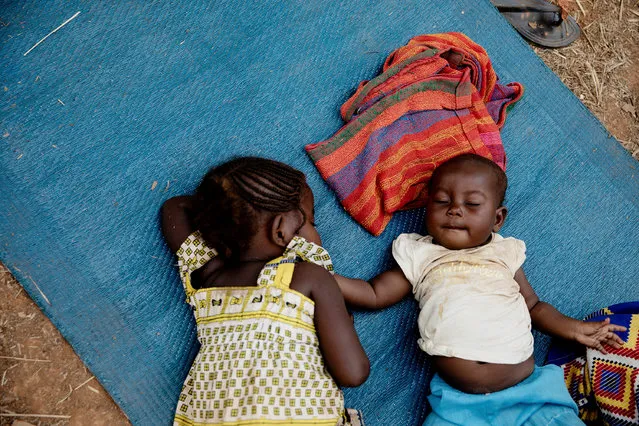
Children sleep in an Internally Displaced Peoples (IDP) camp in Liton, Central African Republic, 10 February 2021. Cases of malnutrition, malaria and diarrhea have increased in the health center located by the site. More cases of children coming with multiple diseases at once are also noticeable. The Central African Republic has extended the current state of emergency for six months as the fight against a coalition of rebel groups continues. The IDPs have been given food aid by the organisation PAM once, and non-food items by Action Contre la Faim. More international organisations are waiting for possibilities of actions but even though Liton is only 22 kilometers away from Bangui they haven't been able to reach due to security concerns. Some 2,559 people have been displaced in the village of Liton, in the Central African Republic since mid-January. More than 240,000 people have left their homes, to take refuge in neighbouring countries, or inside the Central African Republic since 15 December 2020 according to the United Nations Office for the Coordination of Humanitarian Affairs (OCHA). (Photo by Adrienne Surprenant/EPA/EFE)
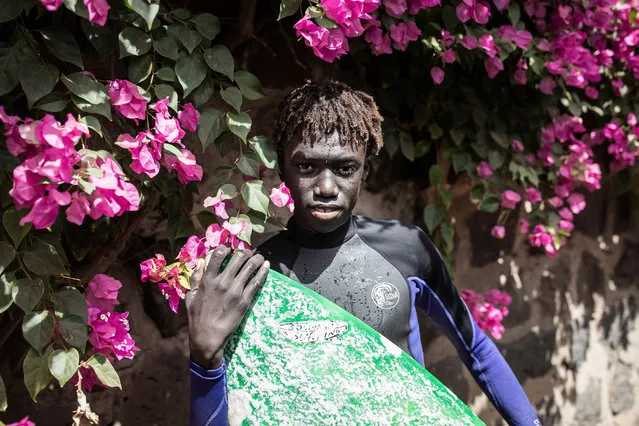
Young Senegalese surfer, Djibril, poses for a portrait on Ngor Island in Dakar on January 28, 2021. Surfing and surf culture in Dakar has exploded in the last years where a very tight-knit community focuses on bringing up the next generations of Senegalese surfers. As more Senegalese surfers find sponsors and global recognition the younger surfers see what’s possible and are pushing harder than ever to get there. (Photo by John Wessels/AFP Photo)
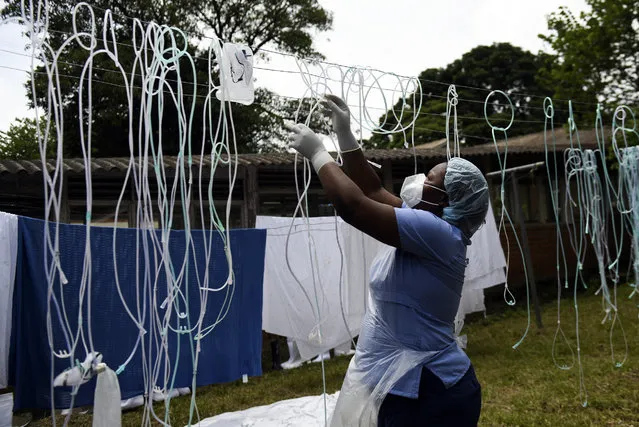
A health worker dries decontaminated nasal prongs and oxygen face masks at Queen Elizabeth Central Hospital in Blantyre, Malawi on Saturday, January 30, 2021. Malawi faces a resurgence of COVID-19 that is overwhelming the southern African country where a presidential residence and a national stadium have been turned into field hospitals in efforts to save lives. (Photo by Thoko Chikondi/AP Photo)
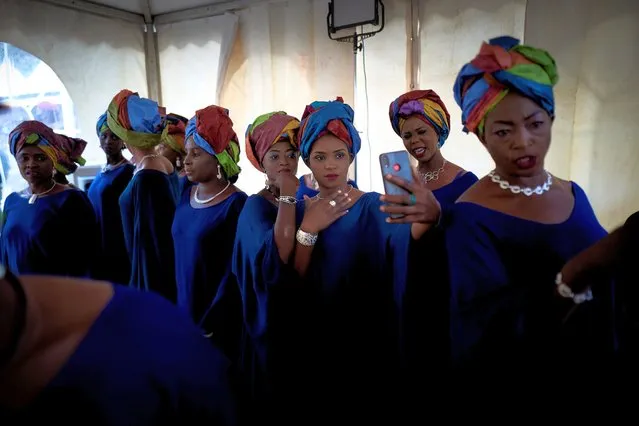
Two Gold diggers take selfie pictures with their mobile phone while waiting in the backstage for the start of the fashion show as part of the first edition of the International Gold Fair, in Bamako, on February 12, 2021. The Princess of Burundi, selected 34 women among gold mines workers in southern Mali, to walk down the catwalk for a fashion show organised during the International Gold Fair. Gold represents 15% of Mali's exports and more than 20% of its GDP estimated at nearly US$20 billion by the end of 2019. (Photo by Michele Cattani/AFP Photo)
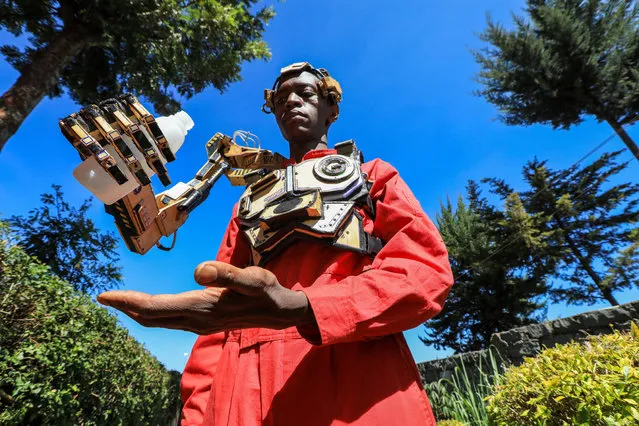
A Kenyan self-taught innovator David Gathu 29, using a neuro load bio potential head set receiver he illustrates how their recently invented robotic arm is operated at their makeshift workshop in Kikuyu, Kiambu, north of Nairobi, Kenya, 26 January 2021. Neither Gathu nor his partner Moses Kiuna 26, were able to pursue higher education, because they could not bear the university costs, and have spent years developing technological innovations to solve problems in their community, from safety to health, and now, in the middle of a pandemic, they have developed a device to disinfect surfaces and spaces of the covid-19. By using raw materials from other discarded appliances they have in recent years innovated numerous technological solutions such as a robotic arm or a security application, but in recent months, they have focused their efforts on developing a “disinfectant machine”. The device, which is still in the prototype phase, oxidizes oxygen molecules to convert it into another gas, ozone, which has a great capacity as a disinfectant, Gathu details, while doing a demonstration of its operation. (Photo by Daniel Irungu/EPA/EFE)
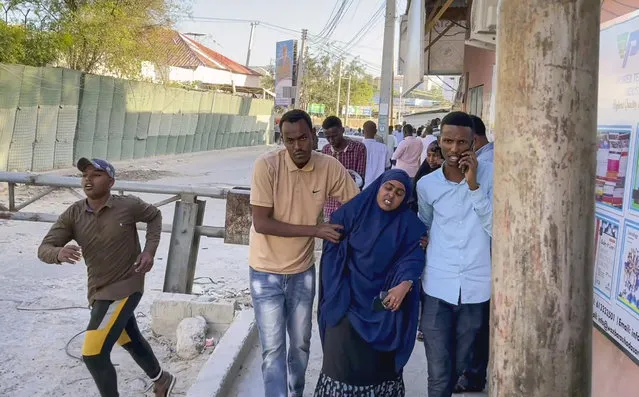
In this image made from video, people flee from the area as gunshots are heard, on a street near the Afrik hotel in the capital Mogadishu, Somalia Sunday, January 31, 2021. The hotel in Somalia's capital has been hit by an explosion and an attack by gunmen, according to police. (Photo by AP Photo/Stringer)
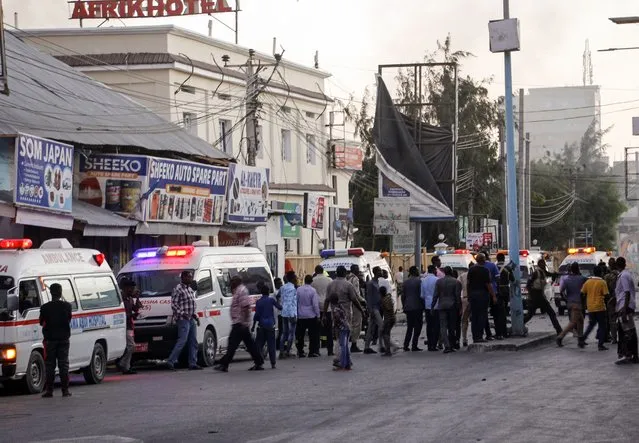
Ambulances and security forces gather on the street outside the Afrik hotel in the capital Mogadishu, Somalia Sunday, January 31, 2021. (Photo by Farah Abdi Warsameh/AP Photo)
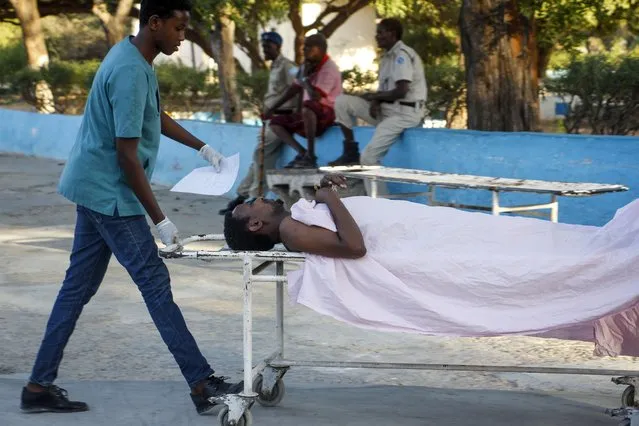
A medical worker pushes the stretcher of a civilian man wounded in an attack on the Afrik hotel in the capital Mogadishu, Somalia Sunday, January 31, 2021. (Photo by Farah Abdi Warsameh/AP Photo)
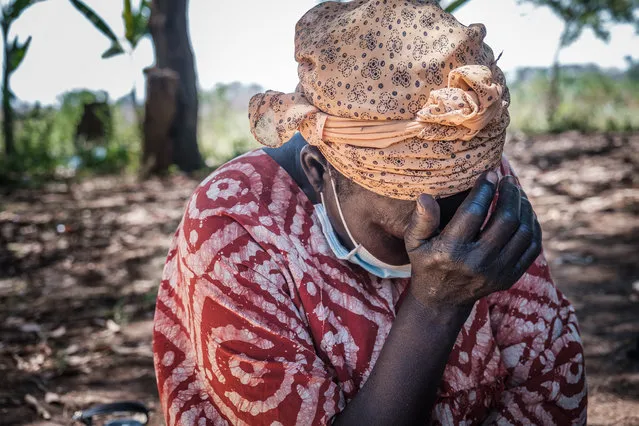
A woman in Lukodi town, where dozens were killed in 2004 by the Lord's Resistance Army, weeps as she listens to Dominic Ongwen's verdict on the radio in Lukodi, Uganda, on February 4, 2021. The International Criminal Court in The Hague, Netherlands, on February 4, 2021 convicted Dominic Ongwen, a Ugandan child soldier-turned-Lord's Resistance Army commander, of war crimes and crimes against humanity. (Photo by Sumy Sadurni/AFP Photo)
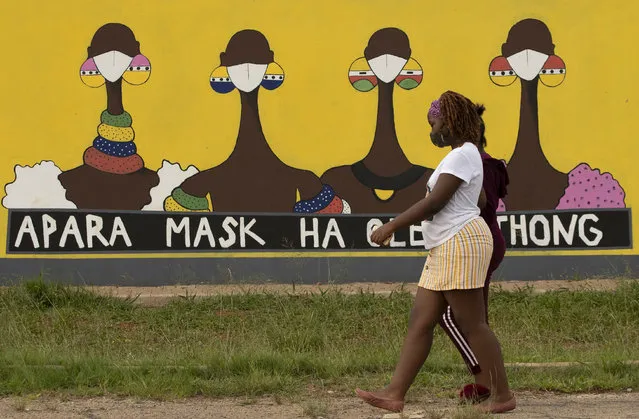
A woman walks past a coronavirus-themed mural promoting the use of face mask in public place, in Sebokeng, Vereeniging, South Africa, Thursday, January 28, 2021. (Photo by Themba Hadebe/AP Photo)

Students pose for a selfie during their graduation ceremony at the Stella Maris University campus amid the COVID-19 pandemic, in Monrovia, Liberia, 29 January 2021. The Stella Maris Polytechnic is a private institution of higher learning and operated by the Catholic Archdioces of Monrovia. (Photo by Ahmed Jallanzo/EPA/EFE)
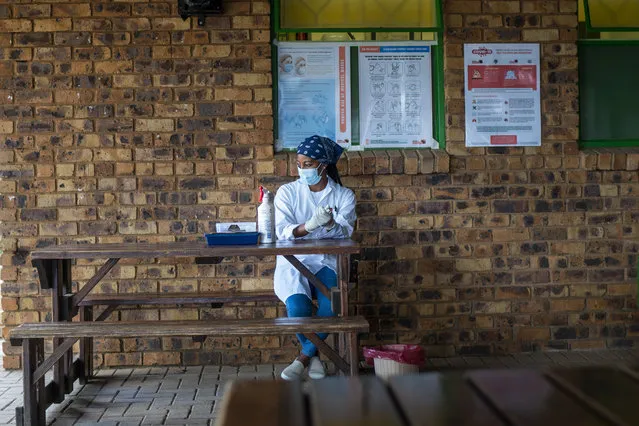
Carol Ditshego waits for patients coming for a COVID-19 test at the Ndlovu clinic in Elandsdoorn, 200 kms north-east of Johannesburg Thursday February 11, 2021. The Ndlovu center is running a study of the Johnson & Johnson COVID-19 vaccine with 602 people from the community participating. (Photo by Jerome Delay/AP Photo)
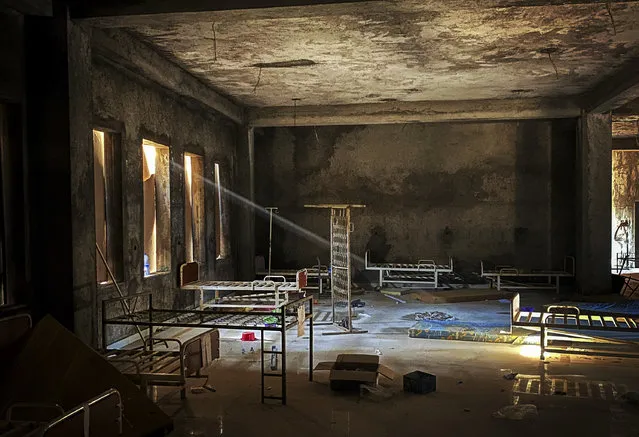
A looted room is seen at the Adwa General Hospital in the town of Adwa in the Tigray region of northern Ethiopia Tuesday, January 12, 2021. Rare witness accounts are illuminating the shadowy conflict in Tigray, which is largely cut off from the outside world as fighting enters a fourth month in a region of 6 million people. (Photo by Matt Hotchkiss/Medecins Sans Frontieres via AP Photo)
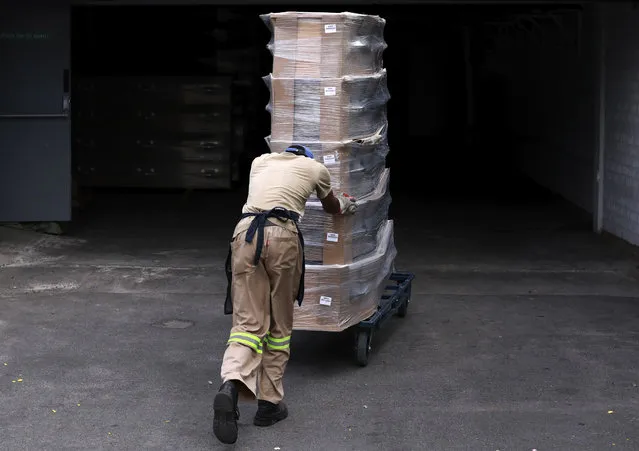
A worker unload coffins from a delivery truck for sale at AVBOB's funeral parlour in Bellville, Cape Town, South Africa, Saturday, January 30, 2021. The COVID-19 pandemic has claimed the lives of more than 10,000 people in the Western Cape Province with burial space running out in the inner city and crematoriums running six days a week out of curfew hours to keep up with the demand. (Photo by Nardus Engelbrecht/AP Photo)
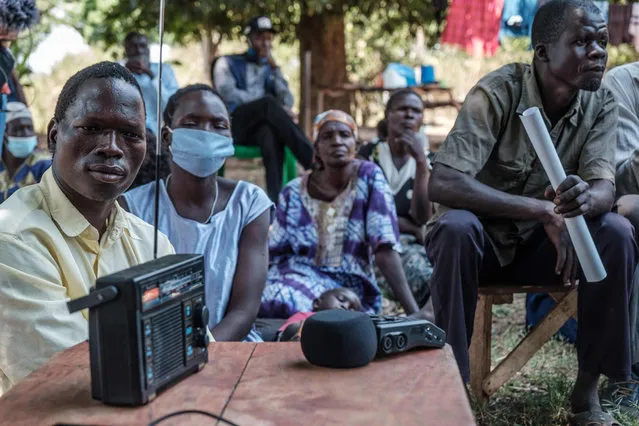
Mohammed Olanyia (L) who lost his whole family in 2004 in the Lukodi massacre, listens to the radio with his neighbours in Lukodi, Uganda, on February 2021 during the verdict given by the International Criminal Court (ICC) on Dominic Ongwen. The International Criminal Court in The Hague, Netherlands, on February 4, 2021 convicted Dominic Ongwen, a Ugandan child soldier-turned-Lord's Resistance Army commander, of war crimes and crimes against humanity. (Photo by Sumy Sadurni/AFP Photo)
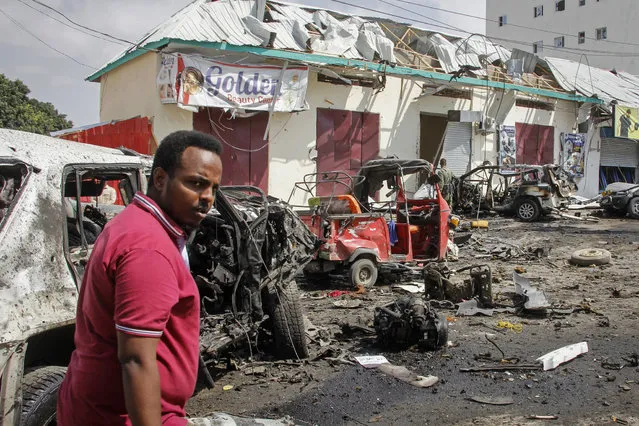
A man walks past wreckage at the scene of a bombing in Mogadishu, Somalia, Saturday, February 13, 2021. Police say a suicide bomber died and a number of civilians were wounded when a vehicle exploded near a checkpoint outside the presidential palace in Somalia's capital, Mogadishu. (Photo by Farah Abdi Warsameh/AP Photo)
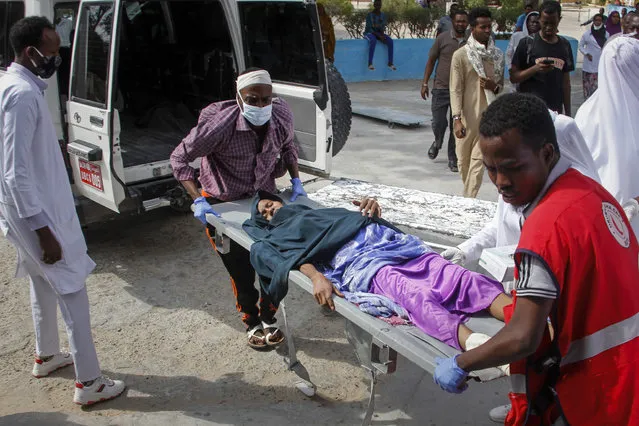
A woman who was wounded in a bombing is stretchered into a hospital in Mogadishu, Somalia, Saturday, February 13, 2021. (Photo by Farah Abdi Warsameh/AP Photo)
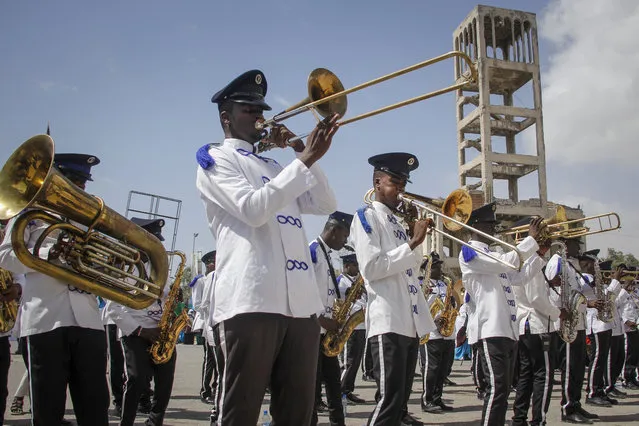
A band plays music at a demonstration supporting a resolution to allocate 13 seats to the Banadir region which encompasses the capital, in effect expanding the Senate, in Mogadishu, Somalia Friday, January 29, 2021. As Somalia marks three decades since a dictator fell and chaos engulfed the country, the government is set to hold a troubled national election but two regional states are refusing to take part in the vote to elect Somalia's president and time is running out before the Feb. 8 date on which mandates expire. (Photo by Farah Abdi Warsameh/AP Photo)
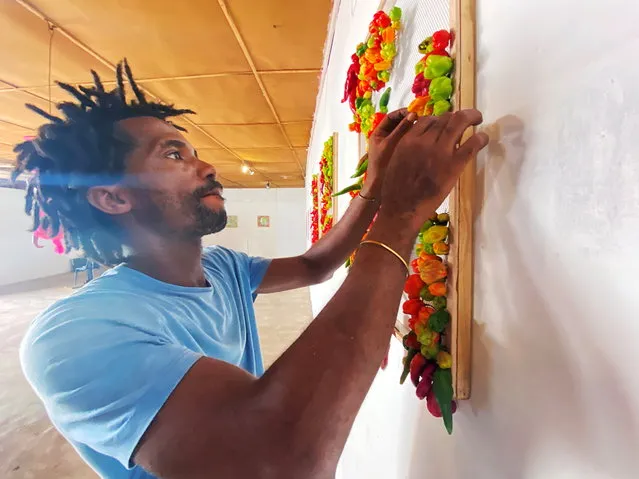
Nigerian artist Olufela Omokeko sets up an exhibition of fresh pepper motive at a gallery in Iwaya, Lagos, Nigeria on January 30, 2021. (Photo by Seun Sanni/Reuters)
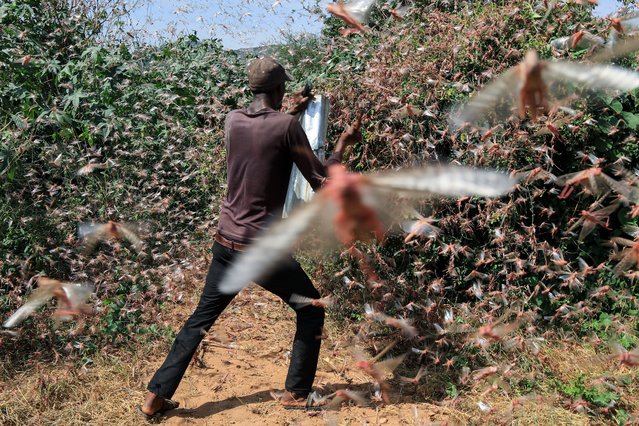
A man uses iron sheet to make noises, as a way of trying to disperse desert locusts that had invaded their farms during the second wave invasion in Kakongo village, in Nuu-Mwingi East, in Kitui, Kenya, 06 February 2021. The second wave invasion of the desert locusts in the country comes at a time where most famers are expecting to harvest their farm produce in the country. According to the United Nations Food and Agriculture Organization (FAO), on 04 February, warned numerous immature desert locust swarms persist in southern Ethiopia and Kenya. Some of the swarms are in community areas and therefore cannot be treated. In Kenya, immature swarms continue to spread westwards across northern and central counties where there are currently about 20 small swarms present, mostly about 50 hectares in size, it said. (Photo by Daniel Irungu/EPA/EFE)
25 Feb 2021 08:17:00,
post received
0 comments
